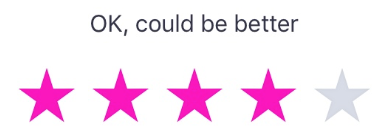
I’ve hated rating people ever since I first encountered the practice. That was where everybody else does too: in school.
After all, rating people is what schools do, with tests and teachers’ evaluations. They do it because they need to sort students into castes. What’s school without a bell curve?
As John Taylor Gatto put it in the Seven Lesson Schoolteacher, the job of the educator in our industrialized education system is to teach these things, regardless of curricular aspirations or outcomes:
- confusion
- class position
- indifference
- emotional dependency
- intellectual dependency
- provisional self-esteem
- that you can’t hide
It’s no different in machine-run “social sharing” systems such as we get from Uber, Lyft and Airbnb. In all those systems we are asked to rate the people who share their cars and homes, and they are asked to rate us. The hidden agenda behind this practice is the same as the one Gatto describes above.
I bring this up because yesterday my wife and I had our first less-than-ideal shared ride. To spare everyone involved, I won’t say whether it was with Uber or Lyft, or where the ride went. I will say the ride is normally around half an hour, and we’ve taken the same ride dozens of times.
First, the driver didn’t help us load our two heavy bags into the trunk of his car, which had a lot of loose crap in it.(And, to be fair, lots of shared-ride drivers have a collection of their own stuff in the trunk.) Maybe he declined because there was heavy traffic and we all needed to get a move on, or he didn’t see the bags; but let’s just say that wasn’t normal, or what drivers usually do when picking up people with sizable luggage.
Soon as we were on the road, he asked if we’d mind if he stopped at an ATM, because he needed money for tolls. Seems his EZ-Pass transponder had a problem and needed to be sent in and exchanged, so he was operating without it. We said okay and took a slow parallel highway where he hoped an ATM could be found. He eventually found one at a gas station mini-mart, but the machine had a problem that took about 20 minutes, during which we just sat in the car.
After he got the money, we found our way back to the main toll road, and eventually to our destination. At one point on the toll road I reminded him that he should get a receipt for the toll he paid in cash. At our destination he did get out of the car to help with our bags, but I had already removed them from the trunk.
The whole ride took an hour and thirty two minutes, according to the Moves app on my phone. Since it was rush hour, I’d say the ride took about 45 minutes longer than it should have.
So that’s the down side.
The upside was that he seemed to be a genuinely good guy, trying to make a living and dealing with the world. He recently moved into the area to seek work as a recording engineer: a skill he learned recently at a trade school after tiring of an earlier career as a technician for a mobile phone company. His wife is pregnant with their first child, and they are struggling to make ends meet, which is why he was felt he had to work giving rides, even though he lacked two essential conveniences: an EZ-Pass or enough cash.
He had a lot of interesting things to say about working for Uber and Lyft (he drives for both), what makes a good or a bad ride (he’s had both as a passenger), and whether telling the story of their coming baby would make a good YouTube mini-documentary or podcast. We also talked about history, architecture, culture and travel. He speaks Spanish as well as English and would like to go to Spain someday. He also apologized for the delays, and thanked me for understanding his situation. (Or situations.) And I gave him a tip. (Which I always do, at least in the U.S.)
So, while the ride itself wasn’t great, the conversation was one of the better ones I’ve had with a driver. And I wanted to support the guy’s work.
But I couldn’t not rate the guy, or I wouldn’t be able to get a receipt or book the next ride. So I gave him four stars out of five. That’s the first time I’ve given any driver less than five stars. When I clicked on the fourth star, the app said what you see in the screen shot (from my phone) above. “Okay, could be better” was about right. Still, I would much rather have said nothing—or to have sent a note to the company. Anything but giving the guy some number of stars.
And no, I don’t know a better way. I am just sure that rating people is icky, and would rather say nothing than stroke or damn somebody with a star.
Leave a Reply